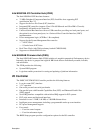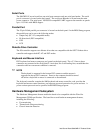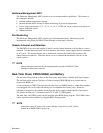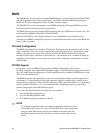Description 21
BIOS Updates
The BIOS can be updated using either of the following utilities, which are available on the Intel
World Wide Web site:
• Intel
®
Express BIOS update utility, which enables automated updating while in the Windows
environment. Using this utility, the BIOS can be updated from a file on a hard disk, a 1.44 MB
diskette, or a CD-ROM, or from the file location on the Web.
• Intel
®
Flash Memory Update Utility, which requires creation of a boot diskette and manual
rebooting of the system. Using this utility, the BIOS can be updated from a file on a 1.44 MB
diskette (from a legacy diskette drive or an LS-120 diskette drive) or a CD-ROM.
Both utilities support the following BIOS maintenance functions:
• Verifying that the updated BIOS matches the target system to prevent accidentally installing an
incompatible BIOS.
• Updating both the BIOS boot block and the main BIOS. This process is fault tolerant to prevent
boot block corruption.
• Updating the BIOS boot block separately.
• Changing the language section of the BIOS.
• Updating replaceable BIOS modules, such as the video BIOS module.
• Inserting a custom splash screen.
✏
NOTE
Review the instructions distributed with the upgrade utility before attempting
a BIOS update.
Language Support
The BIOS Setup program and help messages are supported in two languages: US English and
Spanish. Additional languages may be flashed in if desired (German, Italian, and French available).
The default language is US English, which is present unless another language is selected in the
BIOS Setup program.
Custom Splash Screen
During POST, an Intel splash screen is displayed by default. This splash screen can be replaced
with a custom splash screen. A utility is available from Intel to assist with creating a custom splash
screen. The custom splash screen can be programmed into the flash memory using the BIOS
upgrade utility. Information about this capability is available on the Intel Support World Wide Web
site.


















